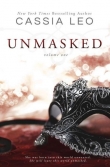
Текст книги "Palimpsest"
Автор книги: Catherynne M. Valente
Жанр:
Классическое фэнтези
сообщить о нарушении
Текущая страница: 12 (всего у книги 19 страниц)
“She’s the one with the bugs, right?” Clara clicked a tongue piercing against her front teeth nervously.
“Yes.”
“I don’t know, I’ve heard the name. I’ve never met her, if that’s what you mean. Nobody likes her. I think she had something to do with the war everyone’s always going on about.”
November raised her eyebrow, rubbing her fingers absently.
“I don’t know,” snapped Clara defensively. “It’s over, the war is over. There’s enough of that shit here. It’s supposed to be different there, nicer, prettier.”
“Prettier, anyway.”
“You only say that because of your face, and your hands.” Clara’s voice pitched upward, like a vase about to fall. Her gray eyes narrowed. “It’s betterfor the rest of us. Easier. It’s the most beautiful place in the world. Nothing but flowers and perfume and jewels. Once I went to a ball where everyone wore masks made of bones—so many skulls—waltzing to violins played by little girls with no faces. The chandelier dripped crystals—everyone rushed to catch them when they fell! It was good luck, you know? My mask was a roc’s skull with a hundred moonstones set into it—do you know what a roc is?”
“Sure. A huge white bird that eats elephants.” The children of librarians are rarely faced with an obscurity they cannot name. November smiled a little, proud of herself.
“Well, Ididn’t know. I had to ask the man in the alligator skull mask, and while he told me about the elephants he undid the ribbons of my dress and let it fall to the floor. He ground his teeth against my beak and called me Corazonand kissed me until I couldn’t breathe. I danced naked with all those men in jeweled skulls, and they lifted me up into the air, fed me chocolates, poured blue champagne into my mouth . . .” Clara was transported by the memory, her hands on her throat, her eyes wide and shining. She looked at November for confirmation; her savaged face brought Clara back to the little table and the tea. “I’m sorry it’s so bad for you,” she hissed. “I’m sorry it took your face. I’m sorry she took your fingers. But don’t ruin it for me.”
November smiled weakly. Would she go there, someday, and wear a mask of bone? Would Casimira take her, and dance with her under that dripping chandelier? Would she take a thumb as payment for that?
“Do you know what you carry on your skin? What part of the city?” November asked, eager to talk about anything but her face.
“No, of course not. No one does, unless you’re lucky enough to get into a neighborhood next to it. What are the chances, though?”
“It’s her house, Clara. Casimira’s. On your stomach, right there. And it’s huge, and alive, and she took me inside—”
“I don’t want to hear about this! Casimira is way beyond the circles I move in, and the circles I move in don’t want anything to do with her.”
November waved her hand apologetically, the one that was whole and unmarred and easy to look at. She took a deep breath—this was the big question. The only question. She let it fall between them like a little meteorite, smoking on the table, spoiling the tea.
“Is there a way to go there in the daytime, do you think? Like emigration. Permanent.”
Clara grinned, her elfish beauty returning in a rush from hidden, angry furrows. She leaned in, taking up November’s meteorite and letting it glow. “There are some theories. You know, no one really knows. It’s not like there’s a manual. A couple of times, I heard that someone wanted to write one, publish it as fiction—but wewould know. Wewould see right through all those made-up characters and silly little narrative twists. Wewould know what it was: a primer.”
“What happened?”
Clara giggled—a wild, uncanny sound, not a feminine laugh or a trivial one, but a panicky, animal thing.
“Well, you know, they’d cheerfully burn down any warehouse that carried it. Letters got written, stock changed hands. No one would publish it, not ever, not anything that even mentioned the city. Not me, but . . . there’s this Chinese guy, glasses. Has a sister. It’s really kind of funny, if you take a step back. Like freaking West Side Story. She wants to let everyone in; he’d be the first in line to torch any book that smacked of the place.”
November sipped her tea, overwhelmed for a moment by the bluenessof its taste. She thought of Xiaohui’s brother, endlessly crawling through the Internet and low-circulation magazines to erase a single notice. “I think I know him,” she said.
Clara shrugged. “Probably. There’s not too many of us on the West Coast. No one knows where it started, though once, there was this guy, maybe the fourth or fifth one I had, you know, the fourth or fifth one with the tattoo, and he told me this horrible story. We were lying around naked in his house, eating leftover pad thai and drinking bourbon, and he looked at me all funny and said he’d heard there was a woman in Cambodia or something, I think it was Cambodia, anyway it was a really long time ago, way before the war—”
“Which war?”
“Either one. Before, like, white people or anything. Anyway there was this woman. She fell in the Mekong River when she was pregnant, and these mynah birds came flying in from everywhere and fished her out, and they bit her a lot doing it and she almost bled to death after almost drowning. The river mud got all into her, and she had fevers and infections for weeks and weeks. Everyone prayed over her. And then, after ages, she just got up and walked again one day. Talking and making soup and things like that. But she was crazy afterwards, and she went to every village and got their shamans to tattoo her with secret, obscene things, ugly things, and she couldn’t stop until she was completely black, all over, and no one could tell anymore what her tattoos looked like, and that was a relief.
“But she had her baby and named it Chanthou—I think it was Chanthou—and after that no one would feed her or let her sleep in their huts. Because the baby was tattooed all over, too, not as much as her mother, but still pretty bad, even the whites of her eyes. And the baby never learned to talk, even when she grew up, so they thought she was a devil. But she was still beautiful. The men in the village paid her to let them fuck her, and so she got to eat, still. Probably her mother, too. Not a lot of work in a village like that. But it was the daughter they paid the most for. And every time one of them slept with her, they’d wake up with one of her tattoos, and one space on her body would be clean and blank again, just skin. The men had to hide it, but the daughter was so beautiful and so quiet and so goodthat they couldn’t leave her alone. But that kind of stuff is pretty hard to hide.”
Clara looked nervously away from November’s blackened face and cleared her throat. “So finally, the wives in the village got together and snuck up on her at the well and beat her until they thought she was dead. They just left her there. And that was it, right? Except that no one buried her, since she was a witch and all. But the body disappeared. After that, the men who had slept with her kept on seeing her in the jungle, without any tattoos, smooth and brown, just standing there, all quiet and creepy, with a tiger sitting on either side of her. She would hiss at them, like a cat, and disappear.
“But then the mother disappeared too. And after a while no one saw the girl or her tigers anymore. But just when everything was normal again, the men started to disappear, one by one, and the women, too. There was no one to take care of the farms or keep the well clean or keep the roofs sewn up. And when the shamans from other villages came to see what had happened to the village, to see why no one came to trade rice or shrimp or ask for wives, there was no one left in the village at all, and they put bones and stuff at all the corners and threw salt everywhere and said it was cursed. And supposedly no one lives there even now, it’s just a blank space in the jungle. A big circle.”
“Sounds kind of familiar.”
“Yeah. I admit, I always kind of keep my eyes open for a girl with tigers, but even if it were true, it would’ve happened so long ago that I suppose that’s pretty stupid.”
November shrugged. “But you don’t know how to get there any other way? Or how to stay?”
“Nope. Nobody does. Nobody here. I don’t think there, either, though. But come on. Just . . . enjoy it. Isn’t it niceto know a secret?”
The tea had gone cold. “But the thing is, Clara, I don’t think I can get there that way, anymore. My face and my hand . . . it’s hard enough for you, and you’ve lived with me for three days.”
Clara flushed with embarrassment. She seemed so young, built up out of snow and ice cream. “November,” she said angrily, “it doesn’t work like that. It’s not just pretty people. You can’t hide what you are, now, and I’m sorry. But it’s not the end of anything.”
“I was lucky even to find you.”
“Oh, that?” Clara gestured away a world of concern. “I’ll give you a number. You’ll be fine.” She closed her hand over November’s maimed hand. “It gets easier. Really.”
_______
November had not been able to bear her bees when she got home from Clara’s tea and wide hips. She knew it was wrong, neglectful, that the honey might suffer from their distress, but she could not make herself cross her little wheat-tufted field to the hives. Instead she sat in her bare, angular bedroom and pulled a single brown book from the endless rows of brown books. The one with the naked child on the cover, holding up her dress to catch the wind. She opened it to a well-thumbed first page. When her father finally bought the book for her, instead of letting her drip honey and milk all over the library copy, she often used to just read the first page, for comfort, like covering herself in a favorite blanket.
Once upon a time, a girl named September grew very tired indeed of her father’s house, where she washed the same pink and yellow teacups and gravy boats every day, slept on the same embroidered pillow, and played with the same small and amiable dog. Because she had been born in May, and because she had a mole on her left cheek, and because her feet were very large and ungainly, the Green Wind took pity on her, and flew to her window one evening just after her birthday. He was dressed in a green dinner jacket, and a green carriage-driver’s cloak, and green jodhpurs, and green snowshoes. It is very cold above the clouds, in the shantytowns where the Six Winds live.
“You seem an ill-tempered and irascible enough child,” said the Green Wind. “How would you like to come away with me and ride upon the Leopard of Little Breezes, and be delivered to the great sea which borders Fairyland? I am afraid I cannot go in, as Harsh Airs are not allowed, but I should be happy to deposit you upon the Perverse and Perilous Sea.”
“Oh, yes!” breathed September, who, as it has been said, disapproved deeply of pink and yellow teacups, and also of small and amiable dogs.
November wiped the tears from her eyes with the back of her mangled hand. September had said yes.More than the name, that had been what had struck November, then, in her father’s house, swinging her legs under a huge chair. She had said yes, without hesitation, without worry or fear, without a moment’s thought for her mother or her father. September had said yes, with all her heart, and so she had gotten to go to Fairyland, where other children had to stay in Omaha and wash dishes.
In the margins of Hortense Weckweet’s novel, November had written long ago in a tiny, uncertain hand: Things I Will Try to Say More Often: Why? I love you. I’m sorry. May I have chocolate? Yes. yes. yes.
November picked up her telephone and dialed the number Clara had given her. It rang twice: precisely correct. He would be here in two hours.
It is a long drive from the city, you understand.
Of course, yes.
_______
When he arrived, November was surprised just how little she felt about the whole business. He was nothing to her, a conduit, a door. When she closed her eyes, she could not picture his face, even though his lips moved over her shoulders. He was just a door, a tall, broad door in a long green coat, which made her smile so brightly and with such a keen joy that despite her face and her missing fingers he swept her up into his arms as though they were in a movie. November let herself warm to him. She touched his face, a thin dark beard, sweet green eyes that seemed tired– from the drive,she thinks. We all get plenty of sleep, after all.
But his arms were huge around her, slabs of flesh closing her in, keeping her safe. November had never been with a man so much bigger than she was. He dwarfed her, protected her with his mass, sheltered her in his coat. He tried to take it off, but November insisted, delighted with its rough wool against her heavy breasts. Her legs seemed so small around his waist, a doll’s limbs—but she didn’t want that, she decided. Didn’t want to make room for him inside her. November clambered up onto her knees and tucked her hair behind her, leaning down to take him in her mouth, a thing she rarely did and did not enjoy. But he wore a green coat, and he came to her door to take her to Fairyland.
Yes,she thought. Oh, yes.She wanted to thank him for ignoring her disfigurement, for behaving as though she were utterly whole, and the taste of him was neither sweet nor sour, but simply skin, clean and hard, so big she felt her jaw pop as he groaned and moved the shaft of his cock in and out of her throat. November closed her eyes and pictured herself on the velvet seat of the Green Wind’s carriage—or was it Casimira’s? While the huge man in her bed swelled towards his private, wordless orgasm, she was a thousand miles away, in the clouds above Omaha, pushing open the coat of the Green Wind and sitting astride him, taking his—surely green—flesh into hers, rocking back and forth while the Wind moaned and groaned and dug his emerald hands into her buttocks.
But there, in Benicia, November closed her hand over the black mark on the strange man’s huge bare calf. He thatched fingers through her hair, and his cries echoed in her house like a list of things a man can want: god, god, god.
Oblation and Legerdemain
TENEMENTS LINE THE ALBUMEN RIVER,raised on stilts over the wash. It is difficult to say in this late age how they were built, for the stilts are little more than spider silk, and they waver in the wind. But the houses are borne up nonetheless, and it is rumored in the wealthier neighborhoods that the poor have discovered a tree—possibly some sort of pygmy birch—which longs to fly. Logically, then, the riverside slums are collectively referred to as the Aviary.
For obvious reasons, the manufacture of ladders is a highly prized skill in this part of Palimpsest. It is a holy profession, and each rung is possessed of spiritual significance. The first is the Rung of Honest Labor, and the last is the Rung of the Salt of Heaven. Between, each ladderer may stack his own path. If a rung should break, then bad luck infects the household, and at least one child must be adopted out to avert disaster. These are called Little Rungs, and tend to be swapped from house to house in a rough circle through the Aviary, as the quality of local laddery is never so great that they will not eventually return home.
When they are old enough, the young girls of the Aviary greet each morning on the banks of the Albumen. They braid their extraordinarily long hair together to make a great net, and hand in hand, float upon their backs on the gentle currents. Great golden koi live in the shallows of the river, and the poor beasts are ob sessed with the taste of curls. They become tangled in the net, and by noon the girls drag themselves back to shore and gut their catch with small bone knives strapped to their calves. The koi perish in a rapture of braids and young girls’ savage laughter. Their meat tastes of coconuts and birdfat, and the girls have the rest of the long day for their lessons.
Nhean lives in one of the floating houses, an aged man with a paunch and the head of a snarling, split-lipped tiger. He has a livid, purple scar where stripes meet skin. He makes a yellow goulash of the unfortunate koi, and in it is a sweetness coveted by all his neighbors. But he does not like to share, even though he would not have any koi at all if the girls did not make their rounds and share their catch with the elderly who cannot fish for themselves. He eats by himself every afternoon, tearing his meat with fangs savage and rotting.
He is mute, as all of his kind are.
Even the babies of the Aviary know that veterans usually end up here, in the river muck. Children learn better than to chatter at them. A woman with hyena’s feet in the third ward lets some of the fishing girls watch her while she cleans her cassia-wood shunt and peer with held breaths into the place where her larynx once was. Nhean would never allow this. His family has lived in Palimpsest for longer than trees have longed to fly, and he understands the necessity of certain dignities.
Though he has a kind of sign language of his own invention, the local children can only guess correctly the gestures for mother, southeast,and sleep.They would have given up long before now if his goulash was not so wonderful, if it did not have green onions floating in it, and also flowing orange fishtails.
Nhean is also a ladderer, and the rungs between Honest Labor and the Salt of Heaven he names strange things: Phirun, Who Loved Betel Nuts; Sovann, Who Did Not Like His Wife but Never Let Her Know; Veasna, Who Was a Drunk and No Good to Anyone.
Samnang Who Loved Her; Vibol Who Loved Her; Munny Who Loved Her.
Chanthou Who Loved No One.
No one understands this nomenclature, and he does not have the voice explain it. It must be the war, they say. Those must have been the people in his battalion. In his squad. Maybe people he killed.They are wrong, but it is a reasonable story, and he lets it lie.
Nhean, for many years now, has made two of his rungs weak.
They will splinter, eventually, and sooner than the rest. That is how it should be, how it happened in a village long ago, in a green country whose name he cannot even remember anymore.
I remember it, of course. I could tell him. I don’t think it would comfort him. Shall we spoil his day completely? Lean in to his big, striped ear and tell him a single word, a word from another world, which will bring back all the terrible memories he ever wept to forget?
I cannot do it. He is so old. It doesn’t matter now.
_______
Secretly, Nhean keeps a hope in his heart, and at least that is still whole. He hopes that enough rungs break that someday a child will come ’round to him, and he can love it and teach it to make a yellow goulash, and sleep with his tail curled around it at night.
It hasn’t happened yet.
The rungs which are weak are the rung of Chanthou Who Loved No One, and the rung of Mealea, Who Fell in the River.
_______
“Do you remember when mother let us eat caviar for the first time?” Lyudmila asks. “I remember how red the little eggs were, and how they burst on my tongue, and all that fishy golden oil ran down my throat. I loved it, there was so much salt in it, as though they were little sacs filled with salmon tears.”
Oleg frowns. “That was before I was born. I could not have been there, if you were there.”
“Oh,” she says, her fine forehead creasing in confusion. “Of course. I forget, sometimes.”
“I know.”
The river curdles by, and Oleg thinks he can see eyes open in the pale, dark, piscine eyes.
“I remember when you told me the story about the land of the dead,” he says, trying to cheer her up. “I told it to mother and she took my books away for a month. And I remember when I asked that girl, the Polish girl, to marry me. You whispered in my ear that she did not have a yellow rainslicker, and it would end badly.”
Lyudmila bobs her head. “Didn’t it?”
Snow still spatters her hair. He does not think it is meant to melt.
“Will we get there tonight?” he asks. “Where we’re going?”
“I think so. I hope you do not mind heights.” She is quiet for a long while, and Oleg strokes her knee gently, chastely. “It is a strange and pleasant thing to play the game of ‘Do You Remember?’” Mila sighs. “The only answer possible is yes. A nostops the game cold. Do you remember when I went away? From the Brooklyn girl, and also from you.”
“Yes, I’m sorry for that. I’ve said I’m sorry.”
“Didn’t you wonder where I went? Did you think perhaps there was a Prince of Cholera?”
“You didn’t die of cholera,” he points out.
“A Prince of Drowning, then. With a blue umbrella. Maybe he kissed me, and maybe his lips were cold.”
Oleg considers this. It had not occurred to him before, but he is not really upset by it. The dead keep their counsel, and he never expected to be told of his sister’s love affairs.
“Is that what happened?” he asks.
“No.” She shrugs.
“I miss you, Mila,” Oleg says, his throat thick. “Your strange little ways of saying things. I can’t see the world the right way up without you.”
Lyudmila shakes her head, as if to clear it, to make it empty of all that disturbs calm water. “This is . . . difficult for me,” she says.
“It is hardly easy for me! This is such a crazy place. It’s . . . pretty, but it’s not right in the head. But I had to come back! You’re here, and not at home anymore. It’s cold there, now, and I sleep on the floor. I can’t bear our bed. Hester—I guess you don’t know her, but she’s the one who didn’t want to come back, the one with short hair like a boy. She brings me orange juice and cold hamburgers, sometimes, when I don’t have the energy to go out, and that sounds bad, it sounds like things are bad, but I’m okay. I don’t mind. I don’t mind coming to you these days. It’s like I’m your ghost, now. I can be as faithful as you were. I can.”
“Yes, fidelity is important. I select for it.”
“What?”
“It’s so strange,” she murmurs, “that the village of the moon-drinkers was destroyed and yet these spindly little houses on their stalks survived. How can that be? The bombardments were astonishing, wasp-cannons firing fusillades like golden clouds, pale green rockets that sent burrowing weevils into the foundations of every house. I cried. I remember crying. But it was for fidelity, all of it. I understood that, even then. The whole war, just for that. And because of it I learned so many things.” Lyudmila turns her face up to him, her fine, high cheeks streaked in tears. “I believe that you are faithful. That is why I bring you to my boat and stay beside you, because the war said with bombs like beetles that faithfulness must be answered with faithfulness, and that is a harder lesson than it may sound.” Lyudmila cocks her head, as if seriously considering a snarled problem. Her tears stop very suddenly. “And so I am trying to decide,” she says dreamily, “how long I ought to let this go on. It is pleasant to be held by you, after all, and pleasant on a late winter evening to be called Mila, and pleasant to smile at you and receive your smile in return. I am enjoying it.”
“Mila, what are you talking about?”
“A little longer? Just a little? I think I would like to be your sister, for a little while more.” Oleg's grip tightens on the edge of a broken, useless oar. “But I see I have handled it badly, because I have become bored with saying some things and not others, with wearing masks. I should not be blamed. It is my nature. And I must pay the price for that. I am not your sister, Olezhka. Perhaps it was wrong of me to dress myself so that you would think so, but I am not a very nice creature, not really.”
“Please, Mila, don’t talk about this. I can’t bear it.”
“But it is cruel to let you think she is here! I did not realize you would not know the difference. It’s not a very good game if you don’t know we’re playing. It was cruel to let Hester see the hands of the dead with no one to dry her tears. I learned my lesson; I won't do that again. I am capable of learning.”
“I don’t want to hear this. I’ve only just gotten here. Let me lay my head on your lap again. Tell me stories about the municipal parks of the dead.”
“I am worried about you, Olezhka. I do not think you are very well at all, and I love you. I want you to be well.”
“No,” he moans. She grips her parasol tightly. Her snowy hair hangs all around her.
“Look at me, Olezhka! Listen to me. I am . . . something else. The thing I am is called a Pecia. I am . . . like a machine. You would think of me like a machine. I am made of snow, and of silver, and of the bones of river fish. I am covered in the patina of cupolas. Made out of all the things you remember about your childhood, out of Novgorod and the Volkhov, out of a little girl in a red dress, out of wintertime. I was made for you;there is a place where people like me are made. Inside me are not bones as you would think of them, nor blood, yet the things inside me are also red, and also white, as you know bones and blood to be.”
“This is insane. You’re real, I can feel you.”
“Yes, I am real. And I am alive, and warm, and therefore I cannot be Lyudmila. But,” and Mila leans her parasol against the rail, the foxes snoring lightly. She crawls to him along the floor of the boat, her long hair dragging below her. “But I remember Lyudmila. I remember what you remember of her. I know the story of the Princess of Cholera, and I can tell it to you, as many times as you want. I remember the girl in Brooklyn who you wanted to be your wife, and I remember her orange blossoms, how sickening their perfume was in our house. I was built to remember. I was built out of remembering.”
“Who built you?” Oleg is numb, his hand trailing in the pale river, his throat tight as a fist. She smiles and wraps her arms around his knees.
“Palimpsest. Olezhka, did you think it did not love you and pity you? Do you think I did not? For I am as much this place as I am Lyudmila. I remember when you were fourteen, how bitterly you wept in my arms when that little brown-haired girl mocked you. I remember carriages on my skin and a war in my belly. But for all that I can smile at you with Mila’s lips and tell you Mila’s stories and even smell like Mila, all for your sake, to answer the terrible things you cry out for during the night.”
Oleg’s palms sweat. He does not want to know the answer. Do not ask, he thinks, and tries to clench his throat around it. But the question is a lock and it seeks the key of her and he cannot stop himself, even though the taste of it is like the Volkhov, muddy and reedy and cold, and he doesn’t want to, doesn’t want to know, doesn’t want to think or be, just bury himself, in her, in what looks enough like her to pass, in what is good enough. But it flops out of him anyway, and he stares at it, how ugly and pathetic, how himself, how shameful.
“Why,” he whispers, “if you, here, in Palimpsest, are not my Mila, if you are a robot or whatever you say you are, why has she stopped coming to me in the real world?”
Lyudmila looks up at him, and her face is so like his: elongated, made more graceful by high cheeks and fuller lips, by long hair and a finer jaw than his own. But it is his face, his mother’s face, a thing shared privately, jealously, among family. And it is so full of pity and sorrow, love and helplessness, and such disdain. He wants to claw at it with his nails until this well-dressed, lying thing dies and his own Mila is left, until she comes back, his girl, his, and she will remember everything, and apologize for leaving him like a poor dog, and they will be happy, and this will all end.
He grabs her face, his own face, and tilts it to him, pushing his nails into her cheek. Drops of blood show, real and red, red as dreams, and she does not seem very much at all like a machine. He doesn’t want her to speak. He doesn’t want her to say what she knows. But she is close and she does smell like Mila, like dead, wet Mila tangled up in his bedsheets. He kisses her; her mouth opens underneath his, pliable and cool. Oleg does not want to admit that he has wanted this. He claws deeper, and she does not cry out. She tastes like new paint and he wants to vomit, to die on the river rather than face this thing which looks so much like his sister. He shoves her away.
“Get out,” he hisses. “Leave me alone.”
“Am I for this, then? I am to understand that this is what I was built for, to bleed and be kissed? Would you take this whole city thus into your mouth, to bleed her and kiss her?”
“Just go! Mila! I didn’t ask you to be built! It’s not my fault.”
“No one asks to be made. I happen. We just happen.Look at my hand. This not a hand. It is a street winding to you, asking you to love it, asking not to bleed, asking to be walked and adored. You can kiss me if you want to, but not like that, please, I’m so tired, so tired of bleeding for the love of you, of everyone, of all the madmen clawing to get into me.”
Oleg shrinks away from her, his eyes rolling, his fists bunched against his knees. He begins, slowly, to hit his head against the side of the boat. It calms him. He ignores the others’ sensations within him, whose hands he has felt on women, on cabbages, on snail-shells. They are so faint, now, anyway. He has allowed himself to bloody his head only once or twice before. He has not wanted to violate the act, for fear that it would lose its potency with familiarity. Thunk, thunk, thunk.It is as though his poor, battered head can fit within the lock of the world, and turn tumblers to some semblance of symmetry and grace, some kind of rightness, of evenness. Thunk, thunk, thunk.It doesn’t hurt, not really. It is rhythmic, like a heartbeat. His heart is not enough, it needs this to keep the time.
_______
Lyudmila stares at him. She presses down the front of her dress, fretful, unsure. She does not think he means to stop. She wore the snow for him, and the stars, but he does not mean to stop. She wants to touch him—it is in her to want that, she remembers wanting that, and wants it herself, all at once. She is in sync, as she was meant to be, the model of her and she herself in perfect alignment. She feels her components sing with the pleasure of it, but still he does not stop. He will not stop. Slowly, Mila turns and dives into the river, leaving him, her bustle bobbing up like the fin of a great fish, and begins to swim for shore.








